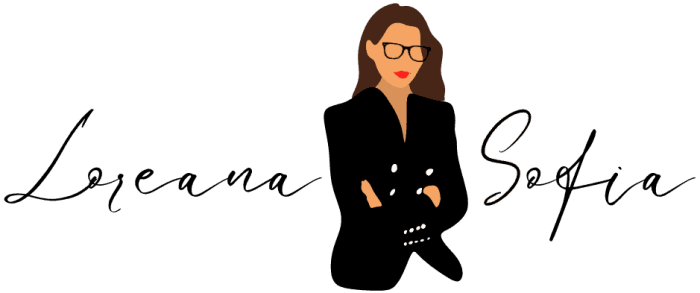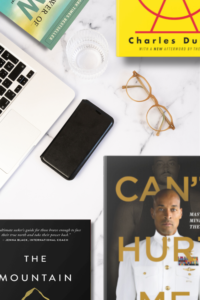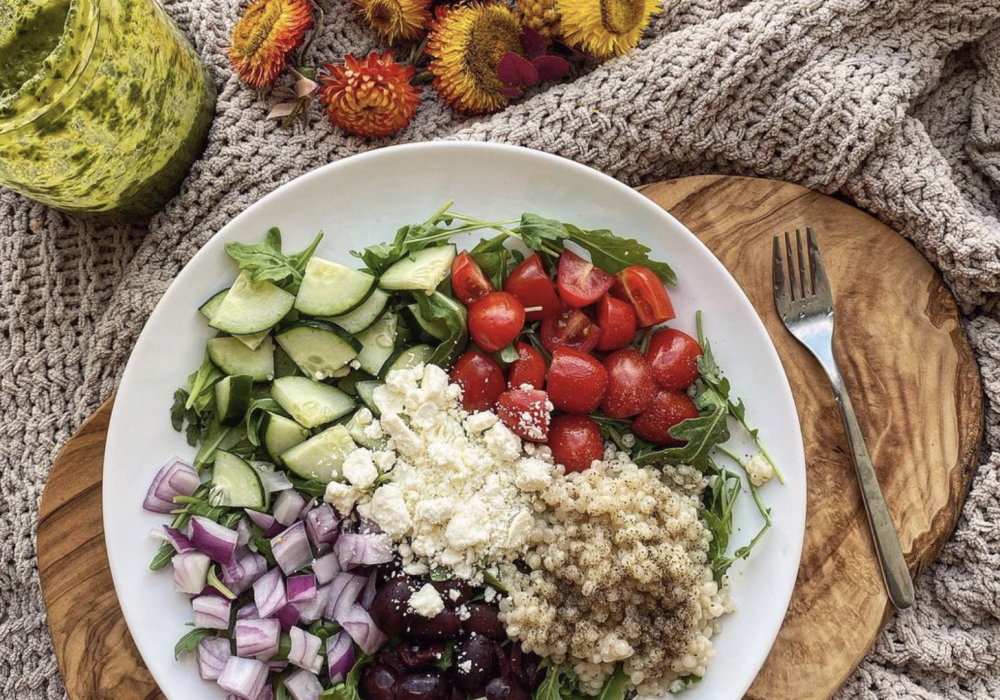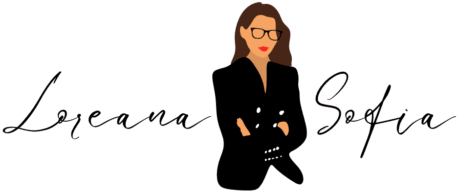Here is some advice on how to get further with your holistic concept of health, for beginners, intermediates and advanced!

If you’ve been reading a lot about nutrition, fitness and wellness in general, you will find that everyone has a different opinion about practically every topic.
And especially if you’re new, that can be overwhelming. What type of workout is best for you? What are you supposed to eat? What shouldn’t you eat?
It’s all very confusing.
The only thing that you should do, no matter who you are, is follow whatever fitness plan, grocery list or yoga guru YOU like best. Not your best friend, not the fitness influencer on Tik Tok, not your mom. YOU.
And most importantly, you shouldn’t be sacrificing anything that you like.
And that’s why I love a holistic concept of health. If you want to get the whole thing right, you have no choice but do what is best for you.
Without further ado, this blog post is all about what the holistic concept of health means, and how you can implement it!
A HOLISTIC CONCEPT OF HEALTH
The Theory of a Holistic Concept of Health
There are lots of ways in which a holistic concept of health is defined. This is the one that makes the most sense to me!
Essentially, holistic health is about a person thriving in all aspects of their being and their life… it’s about looking at the whole(istic) picture.
Working towards holistic health is therefore about properly balancing the actions you take in each pillar of your life (check out the chart below) in such a way that none of them is significantly sacrificed so that another one can excel.
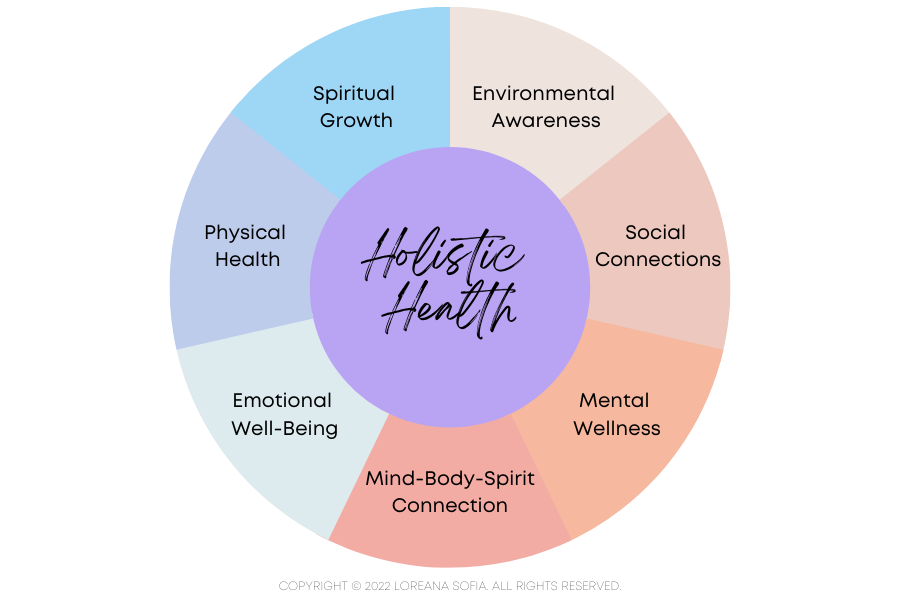
Below is a brief explanation of all of the pillars. But before I get into that, I want you to understand something.
These pillars are the ones I made for myself, my life and my needs. You’ll see that the most common chart is actually 8 Pillars (financial, social, intellectual, environmental, physical, nutritional, emotional and spiritual).
However, in an effort of making things adapted to you (it’s the whole point of the holistic approach to health), I made my own. My 7 Pillars have come from my interpretation of holistic health, and the most important pillars of my life.
But anyhow, as promised, here are mine:
- Mind-Body-Spirit Connection: Recognizing the interdependence of mental, physical and emotional well-being
- Emotional Well-Being: Nurturing and managing emotions to promote overall happiness, health, balance and understanding
- Physical Health: Focusing on the body’s well-being through nutrition, exercise, and preventative care
- Mental Wellness: cultivating a positive mindset, managing stress and enhancing cognitive function
- Social Connections: Building and maintaining healthy relationships, fostering support and deeper connection
- Environmental Awareness: Recognizing the impact of my environment on health and well-being
- Spiritual Growth: Exploring beliefs, values and finding meaning and purpose in life
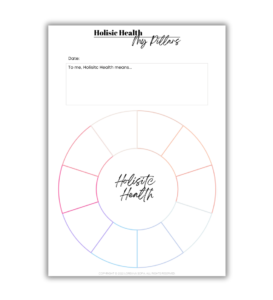
Want a free
HOLISTIC HEALTH WORKSHEET?
Start your day off by filling out this Holistic Health Worksheet, and get a step closer to understand what health means to you. Fill out the form below and have the Holistic Health Worksheet delivered straight to your inbox!
How Following a Holistic Concept of Health HAS to work for you
Are you starting to understand what I said above?
“If you want to get the whole thing right, you have no choice but do what is best for you.“
All those pillars are interdependent. Let me give you an example based on my pillars- an example that I believe is relevant to many of us…
For Example
Weight Loss & Mental Wellness
Let’s say that you wanna lose weight. And let’s say that you saw these before/after pictures of these women who lost an insane amount of weight by going vegan.
Naturally, you decide to go vegan too.
It works for about 1 week, but then things start being so much harder. You’re constantly battling with your mind, who wants to eat and buy all the non-vegan things at the supermarket.
You go over to your parent’s house for the traditional Friday-Night BBQs, yet you can’t eat anything.
And then, inevitably, you cave and absolutely stuff your face with all the meat money can buy.
But then you feel extremely guilty. Not only did you fail to eat vegan, but you also don’t see any different in weight loss after 2 weeks. And you start telling yourself “god, I’ll never make it, I can’t even make it to one month!”
So now, you’re not only feeling guilty and badly, but you’re also always irritable because you hop onto this loop over and over again.
The above example is therefore NOT an example of holistic health. You were trying to work on your Physical Health but to the detriment of Mental Wellness, Emotional well-being and maybe even Social Connections.
So how should you have done it? Well, you should have started by cutting just a little bit go calories each day, while still keeping all the foods that you love.
In that way, no other pillar is heavily compensating for the one that you’re trying to better right now.
(However, if you find that the vegan diet is truly beneficial to you, then you go ahead and keep going with it!!)
Do It Yourself
Your Own Pillars and Habits
Using the Holistic Health Worksheet provided above, write out what holistic health means to you, and what your main pillars are!
Now, follow these steps:
- think about the top 3 habits that you’d like to see more of and the top 3 habits that you’d like to get rid of.
- Start playing out those habits in your head, and try to see how they affect every pillar.
- Now answer these questions: Which pillars are the ones that you have pretty well under control? Which ones are the first ones that you tend to neglect or sacrifice?
A Holistic Concept of Health According to...
Well, enough about theory. Let’s jump right into what suggestions experts would give you if you were to ask them what you should do to help your holistic concept of health!
I’ve included tips for whether you’re a beginner, intermediate or advanced when it comes to practising holistic health.
1. Marie Kondo
Category: Environmental Awareness
“To truly cherish the things that are important to you, you must first discard those that have outlived their purpose. To throw away what you no longer need is neither wasteful nor shameful.”
Mari Kondo, the guru of clean spaces and tidy house! She emphasizes the important of only keeping items that “spark joy”. If you’ve had a look at her Netflix Series “Tidying Up With Marie Kondo“, where she shares her transformative approach to tidying up, and her unique folding methods (among many other things!).
Beginner
1. Once a week, clear one surface of your home from clutter.
2. Once a week, fold and organize one category of clothing.
Intermediate
1. Once a month, declutter a whole room in your house.
2. Sort through, organize and declutter a box of sentimental items every 2 months
Advanced
1. Declutter your entire living space in the span of 6 months.
2. For a year, ensure that no space of your house is cluttered for over a week.
2. Jordan Peterson
Category: Mental Wellness
“Treat yourself like you would someone you are responsible for helping.”
Jordan Peterson is a Canadian clinical psychologists, who emphasizes the importance of individual responsibility and personal development. I love his book “12 Rules for Life“, packed with self-help advice that actually will make a difference.
Beginner
1. Create a basic daily routine, including wake up/sleep times and meals, and stick to it for a week (revise, rewrite and redo)
2. Organize and clean your room, to be repeated as often as needed
Intermediate
1. Develop a positive attitude (reading, mediation, etc) and practice it every day for 20 minutes
2. Spend time every Sunday organizing your week ahead of time, including personal and professional commitments
Advanced
1. Identify a fear and, over a period of 6 months, take gradually bigger steps to overcome it
2. Create a personal development plan for the next year of your life, and stick to it.
3. Gabor Maté
Category: Emotional Well-Being
“As traumatized children, we always dreamed that someone would come and save us. We never dreamed that it would, in fact, be ourselves, as adults.”
Dr. Gabor Maté is known for his expertise on addiction, stress and childhood development. He emphasizes the powerful connection between our emotional experience and our physical health. Make sure to listen to his amazing Podcast with Joe Rogan!
Beginner
1. Spend 5 minutes every evening identifying your emotions and what triggered them
2. At least once a week, share your feelings with a family member or trusted friend
Intermediate
1. Start journaling about your emotions and experiences
2. Practice responding, not reacting, to emotional triggers. Identify 3 common triggers and practice mindful responses.
Advanced
1. Seek professional help to help you work through and overcome unresolved emotions
2. Regularly practice replacing negative self-talk with encouraging and compassionate self-talk.
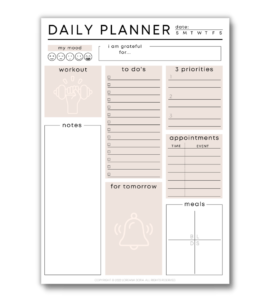
Want a free
DAILY PLANNER?
Start your day off by filling out this Daily Planner, and I can almost promise you that you’ll be significantly more productive. Fill out the form below and have the Daily Planner delivered straight to your inbox!
4. Alan Watts
Category: Spiritual Growth
“If you cannot trust yourself, you cannot even trust your mistrust in yourself – so that without this underlying trust in the whole system of nature are simply paralyzed.”
Alan Watts, a British philosopher, popularized Eastern philosophy for a Western audience. He has written extensively about personal identity, the true nature of reality, the pursuit of happiness and living in the present. Through this, he has promoted an understand of self and of the universe.
Beginner
1. Practice a daily period of silence, for about 5-10 minutes.
2. Practice focusing on the present moment whenever you feel bouts of anxiety or negative feels.
Intermediate
1. Practice eating without distractions at least once a day.
2. Identify one daily situation you usually resist, and practice accepting it as it is.
Advanced
1. Practice extended periods of mediation a couple times a week
2. Make a conscious effort to stay present throughout your day.
5. Wim Hof
Category: Mind-Body-Spirit Connection
“There is so much more to life than meets the eye if you choose to seek it. The seeker becomes the the finder, the finder of so much more than we thought was possible.”
Wim Hof, also known as The Iceman, is a Dutch extreme athlete noted for. his ability to withstand freezing temperatures. He developed the Wim Hof Method, a combination of cold exposure, breathing techniques, and mediation to promote physical and mental health.
Beginner
1. Practice the Wim Hof breathing technique one a day for 5 minutes.
2. End your showers with a 30 seconds of cold water.
Intermediate
1. Increase the amount of time practicing the Wim Hof technique to 15 minutes a day.
2. Increase the cold shower time to 2 minutes, or do a cold plunge.
Advanced
1. Make ice baths a regular practice
2. Climb a mountain in cold exposure following the Wim Hof Method.
6. Andrew Huberman
Category: Physical Health
“The human species was given this tremendous gift of neuroplasticity, the ability to change ourselves and be better in deliberate ways. And my definition of greatness is anyone that’s making that effort, even in a tiny way, just to take this incredible machinery that we were given – this nervous system – and to leverage it toward being better, feeling better and showing up to better for other people.”
Andrew Huberman is a neurologist and tenured professor at the Standford University School of Medicine. He is recognized for his research in brain function, brain plasticity and neural regeneration and his work aims to help people better manage stress, sleep, and both mental and physical performance.
Beginner
1. Spend 10 minutes in natural morning sunlight every day
2. Establish a consistent bedtime and wake-up time every day.
Intermediate
1. Incorporate 10 minutes of deep-breathing every day
2. Incorporate 30 minutes of moderate or high-intensity exercise into your daily routine
Advanced
1. Optimize your sleep routine to enhance your sleep quality
2. Engage in activities that challenge your brain and encourage neuroplasticity.
Nutrition Coaching
Train hard. Eat well. Build your body one day at a time.
Train hard. Eat well.
Build your body one day at a time.
1-to-1 coaching. A sustainable nutrition plan. A lifetime of knowledge.
7. Eckhart Tolle
Category: Mind-Body-Spirit Connection
“Give up defining yourself – to yourself or to others. You won’t die. You will come to life. And don’t be concerned with how others define you. […] You can only lose something that you have, but you cannot lose something that you are. “
Eckhart Tolle is a spiritual teacher, best known for his guide to spiritual enlightenment, The Power of Now. (Though my favorite book is A New Earth: Awakening Your Life’s Purpose.) He emphasizes mindfulness, presence, and the relinquishing of an ego-driven life.
Beginner
1. Become aware of the moments when your ego is driving your actions or thoughts
2. Keep a journal, in which you write down things you are grateful for every day
Intermediate
1. Practice observing your thoughts without judgement
2. Spend regular time in nature, being fully present, without technological distractions or other sorts of distractions
Advanced
1. Practice listening to others fully and completely without formulating responses in your mind (listen to understand, not to answer)
2. Practice observing the Ego without judgement (read The Power of Now to understand!)
8. Peter Attia
Category: Physical Health
“There is simply no better elixir for metabolic health than exercise, nutrition and sleep.”
Dr. Peter Attia is a physician focusing on the science of longevity. His work explores the connection between nutrition, exercise, and health, and how changes in these areas can increase one’s lifespan and quality of life.
Beginner
1. Incorporate a 20-minute walk into your daily routine.
2. Aim for each meal to incorporate a balance of protein, finer-rich carbs and healthy fats.
Intermediate
1. Fast for 16-hours daily for a month (approx. between the hours of 8pm and noon the following day)
2. Incorporate a regular workout routine, for at least 45 minutes & at least 4 times a week
Advanced
1. Try a longer fast (24-72hrs) once a month
2. Develop and maintain an optimal exercise routine tailored to your goals and health.
There you go guys!
I hope that providing these examples from real experts have helped you understand what holistic health is. It’s never about sacrifice, it’s about adding things into your daily life in a way that support your entire being.
xx LS
Share this post
